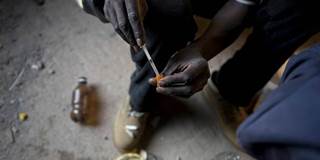The war on drugs has failed, devastating communities and doing little to curb trafficking and abuse. At the upcoming UN General Assembly Special Session on the World Drug Problem, West Africa must advocate for a more sensible approach, one based on public health and respect for human rights.
DAKAR – By now, it has become almost a cliché to say that the war on drugs has failed. The prohibitionist approach, most fully articulated by former US President Richard Nixon, has done little to curb drug use, but it has had devastating consequences for individuals and societies worldwide. In Latin America, to cite one example, it has led to repressive state policies and the militarization of interdiction efforts at the expense of policies addressing the detrimental effects of drug use on health and social welfare.

DAKAR – By now, it has become almost a cliché to say that the war on drugs has failed. The prohibitionist approach, most fully articulated by former US President Richard Nixon, has done little to curb drug use, but it has had devastating consequences for individuals and societies worldwide. In Latin America, to cite one example, it has led to repressive state policies and the militarization of interdiction efforts at the expense of policies addressing the detrimental effects of drug use on health and social welfare.